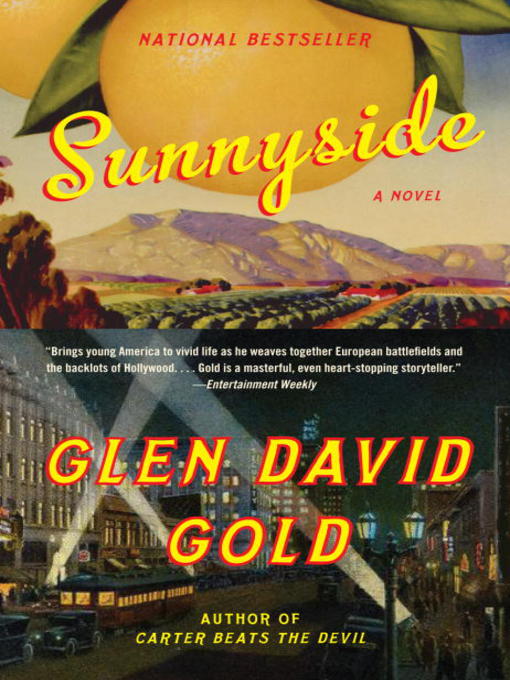
Sunnyside
- اطلاعات
- نقد و بررسی
- دیدگاه کاربران
نقد و بررسی

Starred review from March 30, 2009
From the bestselling author of Carter Beats the Devil
comes an elegant blend of reality and fiction, war drama and Hollywood glamour. Gold sets into motion his cameo-heavy, multipronged plot with a bizarre incident in winter 1916, when Charlie Chaplin is spotted simultaneously in 800 places across the country, causing mass hysteria and panic. The primary story line follows Chaplin's struggles with women, creativity, film budgets and his opposition to the war. In a second, intersecting world, Leland Wheeler moves from the hinterlands to San Francisco with dreams of being a film star. He rechristens himself Leland Duncan, and though he gets shipped to the battlefields of France, the two ailing puppies he finds over there later provide his entrée to the movie biz. Finally, Hugo Black is a Detroit gentleman who volunteers for the infantry in an uncharacteristic whim and finds himself fighting in America's secret invasion of Russia. The result is a dramatic narrative of chance and coincidence, and also a serious reconstruction of an evolving social landscape. It is wholly exhausting and entirely satisfying: to borrow an idea from Chaplin's great personal-artistic quest in the book, it's a work as good as Gold.

April 1, 2009
A big, splashy novel about a little, splashy subject: Charlie Chaplin, the original movie star.
Gold (Carter Beats the Devil, 2001) takes on much more than the Little Tramp, however. His narrative is set against the broad canvas of the First World War era, with appropriately attendant surrealist moments, as when the German Kaiser marvels at a Wild West show staged by one Duncan Cody, then worries that he will one day have to be fighting these savage Americans, only to be consoled,"Er ist nicht Buffalo Bill." Chaplin, for his part, enjoys the occasional quiet getaway, which nearly earns him a drowning off the wild coast of Northern California but instead results in the acquaintanceship of some fine but never ordinary folk, all of whose stories intertwine with his and wander even farther afield—among other destinations, to northern Russia, where an American expeditionary force landed after the Bolsheviks came to power, ostensibly to secure American materiel but in fact to fight the Reds on their home turf. ("Why am I here?" ponders one soldier, a movie buff."Where am I? And why do we have overcoats? I am depressed.") Gold hits a promising scenario with that adventurist debacle, but he doesn't quite work it for all it's worth, since his story requires travel elsewhere while Chaplin attempts to make a doomed film called, yes, Sunnyside—doomed because, then as always, the suits got in the way. ("The kingpins of the industry, having taken the measure of the situation, finally brought their plans to fruition, with the result of stopping Charlie Chaplin dead in his tracks.") Gold's tale strains from overreach now and again, but that is the price one pays for such ambition—and this is an ambitious, very well-written book full of memorable moments, not least of them starring Rin Tin Tin.
Historical but not didactic, in the manner of the master of the genre, E.L. Doctorow, and more completely realized than Gold's debut.
(COPYRIGHT (2009) KIRKUS REVIEWS/NIELSEN BUSINESS MEDIA, INC. ALL RIGHTS RESERVED.)

Starred review from April 15, 2009
Charlie Chaplin has just been sighted: he's afloat on a skiff off the Northern California shore, without oars or sail and drifting onto the rocks. Before rescue arrives, his boat sinks. A battered black derby floats, alone, on top of turbulent waters. But at the exact same time, he's seen all across America in hundreds of places. Thus begins a three-year roller-coaster ride through an America coming to grips with a war many wished we'd never gotten into and the attraction of a new and revolutionary phenomenon: the movies with Mary Pickford, Douglas Fairbanks, and]Charlie Chaplin, whose efforts to realize his destiny are the center of this fantastic farrago of a novel, which weaves from character to character and always returns to Chaplin. He's unfaithful, lecherous, and a bad son, but he has a genius for visual comedy that cries out to be realized. Gold ("Carter Beats the Devil") has written another joyous comic novel that blends fact and fiction to the point where you won't really care what's true and what's not. [See Prepub Alert, "LJ" 1/09.]David Keymer, Modesto, CA
Copyright 2009 Library Journal, LLC Used with permission.

Starred review from March 15, 2009
The phenomenal success of Golds first book, Carter Beats the Devil (2001), a historical novel about the magician Charles Carter, makes it a hard act to follow. But Gold, fascinated by showmanship and illusion, celebrity and notoriety, had an equally alluring subject up his sleeve: Charlie Chaplin and the enchantment of early Hollywood. This brimming saga begins in 1916 with a bang and never lets up, as masterful storyteller Gold imagines Chaplins horror over being condemned as a slacker because he isnt in uniform while the world is at war, his dread of his mother, an infatuation with a schoolgirl, and the longing to kill off the beloved Little Tramp in his produced-under-pressure 1919 film Sunnyside. Chaplins ludicrous escapades are cleverly entwined with those of a family of grifters, a handsome rube whose love for dogs sustains him during his disastrous service in France, an aesthete ensnared in a military fiasco in Russia, and Secretary of the Treasury William McAdoos corralling of Chaplin, Mary Pickford, and Douglas Fairbanks. The cascade of historic details Gold generates is breathtaking, but it is his electrifying characters, wildly inventive action replete with comedic mishaps and witty dialogue, and trenchant insights into the absurdity of war and the mythic dimension of movies that gather force and velocity to make this such a hilarious, brilliant, and transporting novel.(Reprinted with permission of Booklist, copyright 2009, American Library Association.)




دیدگاه کاربران